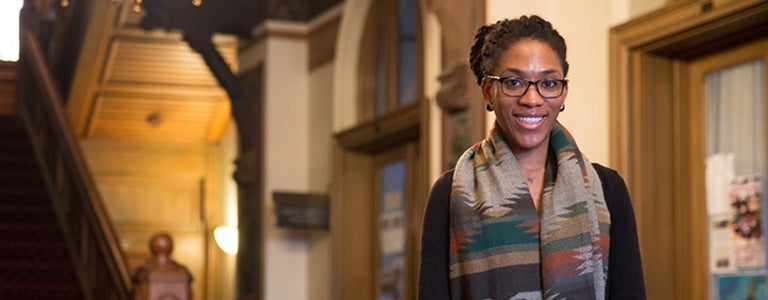Not Just Armchair Activism

Colleen Roberts (C’15) is researching black women’s online engagement as her thesis for the justice and peace studies minor. Photo by Tess O’Connor.
March 31, 2015—“I didn’t really understand the purpose of social media or what benefit it could bring,” says Colleen Roberts (C’15). Now she’s spending her senior year researching black women’s online engagement and how these women are using social media to effect social change.
Roberts is a government major and justice and peace studies minor. For her minor, she chose to write a thesis and picked the topic last fall. “At the time I had become really engaged with everything that was going on in Ferguson via the Internet,” Roberts said. Although these conversations were happening on the Internet, they were mainly filtered through social media, which she has seen expand dramatically in her four years at Georgetown.
“I used to make fun of it, and now it’s a really important indicator and driver of social impact and change,” she continued.
As she investigated further, Roberts found that most of the community organizers and social commentators that she was reading and following were black women, and she saw a lack of awareness about the work these women were doing. “Black women are never appreciated in conversations about leadership and what’s going on the ground,” she said.
History often overlooks the role of women in social movements. “The ‘great civil rights’ leaders and allies are always men. No one is ever really highlighting the women who were really monumental,” Roberts said. “When you think of the Freedom Rides, you think of John Lewis, who is an American hero and instrumental in the entire organization of the rides. But Diane Nash? Things wouldn’t have happened without her, and that’s a name I barely knew.”
Through her thesis, Roberts hopes to highlight current black women leaders and show “the power of social media and the role of black women and how these two forces, when put together, are driving social impact and social change.”
She’s spending the year researching and following leaders such as Charlene Carruthers, national director of the Black Youth Project; Rahiel Tesfamariam, founder of Urban Cusp; Johnetta Elzie, co-editor of the Ferguson Protester Newsletter and organizer for WearetheProtesters.org; and Patrisse Cullors, Alicia Garza, and Opal Tometi, co-founders of #BlackLivesMatter.
Black women, Roberts says, have turned to the Internet to advance their causes after being ignored in traditional forums. “They’re using that space to garner another avenue to do activism [and] to disseminate information. That’s one of the most powerful things you can do for any type of movement,” she explained.
Roberts cautions others not to dismiss this work as just “armchair activism” or that activists using social media “aren’t actually doing social good.” Nor is the conversation limited to 140 characters. Social media, Roberts says, has the ability to lead people to nuanced social commentary about complex issues.
People also often miss the work and strategy behind social media, assuming instead that a movement went “viral.” Roberts began to see this behind-the-scenes work after she noticed the same signs and slogans at protests in different parts of the country. “If you go to these resources, created by people on the ground in Ferguson, people like Johnetta Elzie and Deray McKesson, they also have created policy, chants, protest songs, and signs,” Roberts said.
Sharing information and conscious-raising becomes collective action, a framework she has seen in her justice and peace courses. But the Internet and social media add a new dimension to conscious-raising.
“The Internet spans time and space. I’m able to have a conversation with someone who is in another country, and we can talk about our experiences with racism and sexism and build upon it,” she said. Although Roberts is at a university, where she recognizes that she has the opportunity to engage in critical analysis of these issues, not everyone is. “The Internet still gives us the same access to engage in those conversations.”
Roberts also plans to show the importance of the role of black women in these conversations. “When it’s a woman of color, [she] inherently has the race aspect and the gendered aspect. We’re more [likely] to acknowledge other forms of intersectionality, like the black transgender community,” she explained. According to Roberts, these women provide a critical analysis of different forms of identity and the interactions among race, gender, class, sexual orientation, and ability.
“One of the biggest parts of collective action for communities of color or oppressed groups in general, is that we need to work together to push for something else,” Roberts said. “Constantly being critical is a part of that. That’s why universities and academics exist. Constantly being critical of the status quo is a form of resistance.”
—Elizabeth Wilson
Related Information
Join the conversation and follow some of the leaders highlighted in Colleen Roberts’s work.
- Charlene Carruthers, Black Youth Project
- Dr. Brittney Cooper, Crunk Feminist Collective
- Jenée Desmond-Harris, Vox
- Rahiel Tesfamariam, Urban Cusp
- Johnetta Elzie, WearetheProtesters.org
- Patrisse Cullors, Alicia Garza, and Opal Tometi, #BlackLivesMatter.
Program on Justice and Peace
In the fall of 2014, the College began offering justice and peace studies as major, which includes a thesis requirement. Students in the minor program are no longer required to write a thesis. To learn more about the Program on Justice and Peace, visit the program’s website.